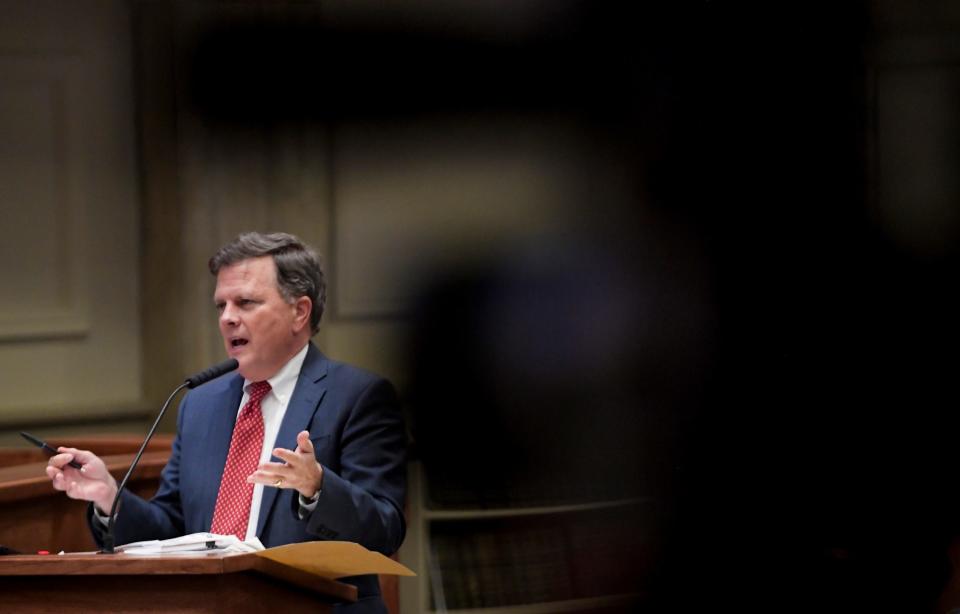Alabama must prioritize workers' right to vote privately on unions | ALLEN HARRIS and JUSTIN HILL
As the American economy has modernized, so has the relationship between unions and workers. In the 1950s, a third of the workforce was a member of a union. In 2022, the percentage of employees in unions was at 10 percent, the lowest level on record. But as the rest of the country has nimbly adapted to economic changes both here and abroad, unions have remained glued to the past.
As former union members ourselves, we have born witness to the coercive tactics and intimidation unions can deploy as they attempt to organize a workplace — a process known as card check. From our superiors and supervisors passing us union cards and demanding we sign them (in full view of colleagues, at times), to knocks on our front door by union organizers, it’s surprising to see that today’s unions have refused to adapt to more modern trends that increasingly seek to honor workers’ privacy and independent decision-making.
With union membership across the nation declining, unions’ unwillingness to modernize are stunting their growth and undermining their credibility with workers. To make up for their shortcomings, they have run to the federal government for help enlisting new members. Instead of seeking to understand why workers may be more hesitant to join unions today than in the past, they’ve sought to entrench their position through legislation.

We’ve both witnessed changes in our respective industries — construction and law enforcement — and noticed how more dynamic job opportunities enable capable workers to navigate the job market without need of increasingly politicized unions and their costly membership fees. Indeed, we both left our unions after determining that their priorities were out of alignment with ours, and as the business agents were quick to call a strike but slow to hear our plea, their value proposition didn’t make sense for us. In the end, these decisions are best left to the workers, which is why a number of states, like Tennessee, have enshrined right-to-work in their state constitutions. Alabamans have recognized this right statutorily since 1953.
Now, several states are leading on protecting the spirit and intent of right-to-work by passing reforms that prohibit companies that fail to protect workers’ private ballot vote on unionization from receiving state incentive funds. Tennessee and Georgia have both passed bills securing workers’ right to decide union representation through private ballot elections when an employer receives economic incentives financed with taxpayer dollars. In other words, these states are flexing their legal muscles to determine how their public monies are spent – and telling companies: Do what you will with your own resources, but if you take taxpayer money, you’ll respect workers’ voting rights on unionization.
Alabama is the latest to join the fight and would be the third state to pass such a law within the last two years. Sen. Arthur Orr (R-Decatur) introduced a bill that would withhold state incentive funds from companies if they voluntarily recognize a union without a private ballot process.
Having been on the receiving end of hard-handed union electioneering tactics, it would be a welcome respite for Alabama workers and employers to know they will be insulated from these intimidating situations while on the job. We remember what it was like to be stared down by union leadership when we waffled on whether membership made sense for us. We remember the unions’ efforts to challenge our leadership while supervising a project with their continual interference or running for public office. And while every worker’s experience is unique, and union organizing efforts may vary with regards to methodology and approach, our shared experiences of being coerced should never be experiences that Alabama taxpayers risk subsidizing.
Never has the hourly worker been in a stronger position. Like it or not, from both market demand and the pandemic effect of diminishing labor, wages are at record levels for the entire country. The loudest claim of increased wages by unions is overshadowed by market forces.
We know that Alabama is on the front lines of major organizing efforts brought by some of the world’s most powerful out of state big labor unions, including the UAW. It’s time the state took a stand on behalf of workers and taxpayers, ensuring that public dollars aren’t going to companies that fail to protect employees’ right to cast a ballot — privately and without duress — when determining whether to unionize their workplace.
Allen Harris is CEO of Bailey-Harris and has over 50 years of construction experience.
Justin Hill is a Workers for Opportunity board of advisors member, businessman and former state representative from Missouri. He also served 13 years in law enforcement.
This article originally appeared on Montgomery Advertiser: Alabama must prioritize workers' right to vote privately on unions | ALLEN HARRIS and JUSTIN HILL

